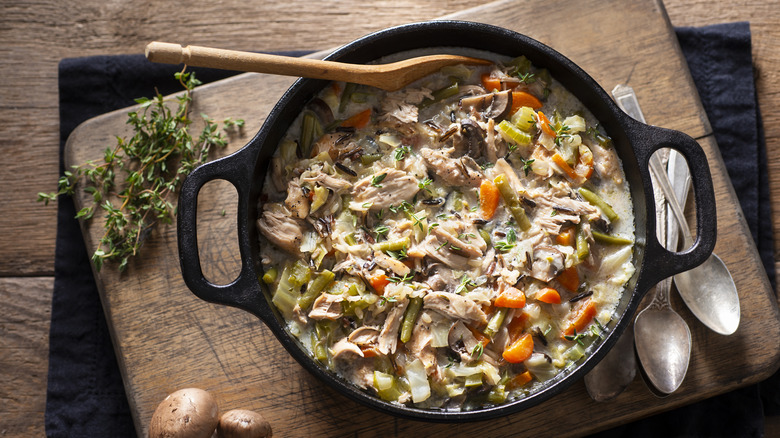No, You Absolutely Should Not Microwave Your Dutch Oven
Dutch ovens — those shiny, enamel-coated pots – are the gems in many kitchens. From simmering chili to melt-in-your-mouth pot roast, these vessels are unmatched in versatility and are often a favorite of home cooks. However, while the heavy pieces can handle everything from an open flame to a blistering broil, Dutch ovens should never be used in the microwave.
If your Dutch oven is housing some tasty leftovers, it might be tempting to throw it in the microwave for a quick reheat. Because the oven contains metal, this alluring trick will likely harm your microwave and even your food. Dutch ovens may come in different finishes but they're all crafted with metal. Specifically, their signature heavy walls and heat-trapping lids are made of cast iron, a metallic material formed with a mixture of iron and carbon. According to Caroline A. Ross, a professor at the MIT School of Engineering, these metals will reflect the electromagnetic waves generated by a microwave oven. This reflection poses a safety hazard and can quickly damage your appliance.
Why the microwave is off-limits
Microwave ovens work by sending electromagnetic radiation through your food. These waves are created at a specific frequency that will vibrate water molecules, which in turn heats the moisture found in your plate of (now steaming) leftovers. When metals reflect electromagnetic waves, the reflection "can produce a concentrated electric field at corners or an edge of a metallic object," according to Ross. As a result, sparks will begin flying from the metal surface.
This process is called arcing and is potentially quite damaging to your microwave. According to microwave manufacturer GE, arcing can cause severe damage to your appliance, even to the point of creating a hole in the interior wall. Any tears in the wall will lead to additional arcing in the future. In the case of Dutch ovens, the likelihood of arcing is low. Sparks and flames typically only occur when the metal sports a sharp, well-defined edge, so smoother pieces of metal are unlikely to create sparks. While the odds are low that your Dutch oven will cause arcing, it's best to be safe when dealing with the potential of fire in the kitchen.
Aside from safety, there's another huge reason why it never makes sense to put your Dutch oven in the microwave. Because metals reflect electromagnetic waves, the exterior walls of the Dutch oven will prevent the waves from reaching its interior. That means your food will never actually heat up!
Other areas to avoid with your Dutch oven
Beyond the microwave, there are a few other areas that you should steer clear of with your Dutch oven. First off, you'll definitely want to avoid putting your Dutch oven in the dishwasher. When the bottom of your Dutch oven is coated with the crusty residue of a large meal, it can be tempting to let the dishwasher handle the mess. However, cast iron (enamel-coated or otherwise) could be ruined in the dishwasher, as the hot water and detergents can scratch or chip the surface. Instead, focus on handwashing with a nonabrasive brush and some dish soap.
You'll also want to keep your Dutch oven away from the reaches of sharp utensils. Pointed forks and hard metal spoons can easily scratch the bottom or outside of an enamel-coated Dutch oven. Dutch ovens that lack an enamel coating are seasoned; they rely on a thin layer of cooking oil to maintain a nonstick surface and prevent rusting. The use of metallic utensils can quickly wear through this layer of seasoning, damaging the pot and exposing it to rust and wear.


